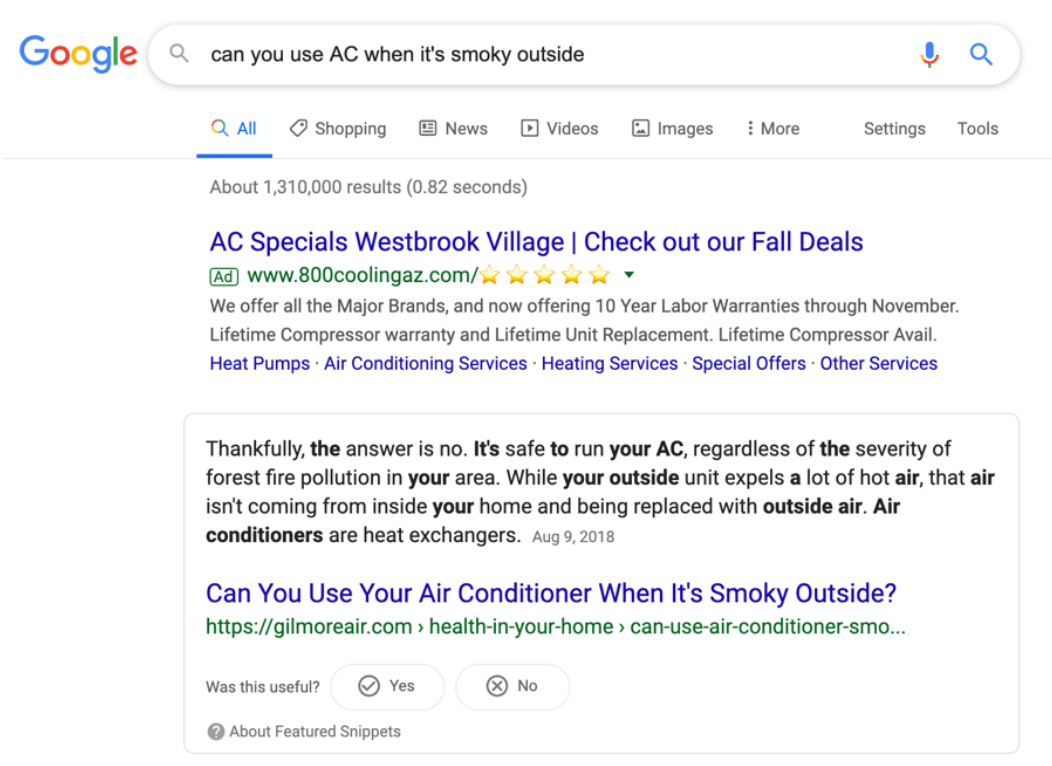
Blogging is valuable for SEO because it provides an additional way to improve your ranking factors. When your business publishes blogs regularly with high-quality content that is synonymous with the industry you’re in, it can greatly impact how your website ranks on Google. Therefore, one of the best things you can do for your business and to improve your search ranks, is to publish blogs.
Keeping Content Fresh and Up-To-Date
When people are searching for answers on search engines, they’re looking for content that was published recently. Majority may find an answer to their question, but if it was an article published more than a year ago, some may believe that it’s unreliable.
Google tries to avoid presenting information that is considered outdated through their search algorithms. Websites that are consistently generating new content is a positive sign for search algorithms and gives Google a reason to index your website more often. When Google believes that you are active on your website and providing current information, you’ll have a better chance of showing up in search results and overall improve your search rankings.
This is why blogs can be extremely crucial to a website’s search performance. Majority wouldn’t be updating their homepage monthly with new content, because it is something that is typically standard and doesn’t need much improvement over time. Blogs can be used as a platform to add fresh content too regularly.
Drives Website Traffic
Google’s priority is to provide users with resourceful or helpful information, so that they will continue to use the search engine. If someone searches for an answer to their question and the first result is something not useful, Google will notice due to the amount of time the user was on the page for. If someone clicks on a page and is only there for three seconds, that notifies Google that the page wasn’t accurate and it will lower the search ranking. That’s why it’s important that the information your blog is providing is relevant and accurate, so that people will stay on your website longer and may even stick around to look at other features your business might have to offer.
Google can also offer a “featured snippet” to users in search results after they have searched for a question using the search engine. A featured snipped is a summary of a page of content that is edited down to provide the user an exact answer to their question. A featured snippet will include the title of the webpage and the exact URL where it was found.

Having a blog post be a featured snippet on Google can provide a massive opportunity to drive traffic to your website. It’s not easy to have a blog post be used as a featured snippet on Google, but if you are constantly updating your website with relevant information and gaining more trust with Google, you have a better chance of achieving one of these coveted spots.
Internal Linking Opportunity
Having links on your website are another important aspect of SEO. One of the easiest ways to create links in your content is through internal linking. One of the biggest mistakes you can make is failing to include internal links on all your pages. You may see opportunities to internally link to pages within your site for example, the homepage or other pages that don’t require much updating. However, with the addition of a blog and blog posts, this opportunity grows tremendously. As you add more pages of relative content to your website, you create more opportunities to add internal links.
Internal links is an SEO strategy used to better communicate with Google overall. By internally linking to another page on your site, you are telling the search engine through the internal link what that page is about you’re looking to and that it is relevant to the other content on your site and to the blog.
Target Longer Keywords
In SEO, researching relevant keywords for your business and incorporating these keywords into content is a common goal. However, the competition may be too large in your area or some keywords may be too long to fit naturally into your website content. Blogs create another way to use these target keywords naturally.
Start a Blog and Connect with Your Target Audience
As you can see, having a blog for your business and consistently publishing quality posts can only better your search rankings and make your website more discoverable. If you’re website is more discoverable, you have a better chance of creating a following of readers that trust the information you’re publishing online. Readers in your target audience who visit your blog regularly, connect with the content you’re publishing on your blog, and even following your posts is the most valuable outcome you can ask for as a business.
Having a blog is the best way to make those connections online and start a ongoing relationship with the audience and customers you’re wanting to reach.
Author: Sydney Fullerton, SEO Account Manager